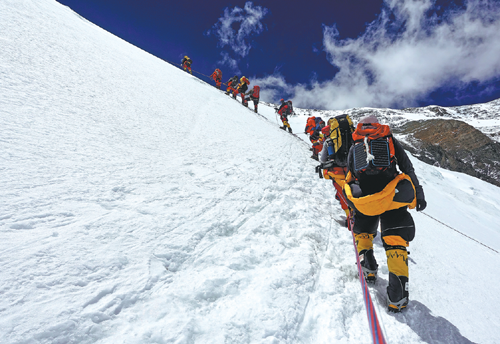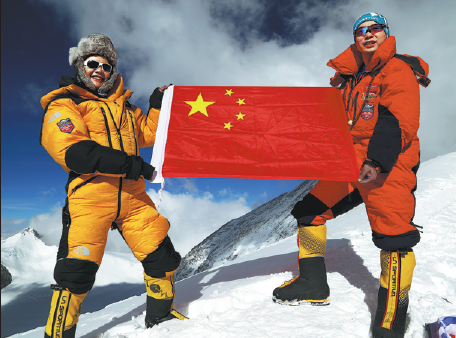Alpinist breaks gender stereotype on Roof of the World
Guizhou mountaineer leads fellow female climbers up Qomolangma, world's highest peak

For Huang Chunyan, 43, summiting Qomolangma in 2017 was a statement against gender bias in her small hometown village. Now, she is leading eight teenagers, five of whom are female, back to Qomolangma — also known as Mount Everest in the West — to help blaze steep new trails where "impossible "was the previous mantra.
Born in an impoverished village in Guizhou province, Huang was repeatedly told that a woman's fate was to rely on men. She resolutely resisted this way of thinking, ever since she was young. Mocked for aspiring beyond traditional domestic roles and often asked "What can a girl achieve?", she found solace in the nearby mountains.
"Wildflowers soaked in sunlight taught me resilience. In the mountains, I felt powerful, like anything was possible."
Childhood escapes to forested mountains bred in her a defiant spirit that led to her making a vow to herself. "I will stand on the world's highest point to prove that women can achieve greatness just as men."
Over the decades, Huang transformed herself from a village girl into a professional alpinist. After enduring over a decade of rigorous training, passing numerous tests and saving 530,000 yuan ($73,000) to cover the costs of climbing Qomolangma, she earned a place in a 2017 Qomolangma expedition team of 21 members, including three women.
Yet the journey nearly ended before it began.
From the moment she entered the Qomolangma base camp, Huang began experiencing severe physical issues: her monthly women's issue arrived early, her eyes turned bloodshot and her body swelled. She even began coughing up blood, while her weight plummeted 10 kilograms. Despite always being healthy, Huang fell ill, and doctors couldn't find the cause.
Despite worsening symptoms, she refused to abandon the ascent. "If I fail this battle, I'll be condemned to a lifetime beneath others' scorn, never to rise again, because opportunities to summit Qomolangma are incredibly rare and costly. Missing this chance means I might never get another, especially as I grow older," she said.
Coping with her aching body through sheer willpower until the final moments, a miracle occurred at the last moment — her illness abruptly vanished, leaving her unexpectedly revitalized. Then, inching up the icy slope like a famished wolf as she wrote in a later book, she ascended to the 7,028-meter North Col, securing her qualification for the attempt to reach the peak of the world's highest mountain.
At the North Col camp, the guides had not prepared a tent for her because they didn't think she would manage to get there based on her physical condition. Therefore, they borrowed an old tent from another team for her to seek shelter in.
However, it was the old tent that made her realize that her previous prolonged suffering stemmed from an allergic reaction to her previous tent's materials. Her symptoms subsided considerably after taking leave of the offending shelter.
From then on, her health steadily improved, and she continuously surpassed other climbers. Ultimately, she ascended to the "throne atop the world in high spirits, just as a queen", and witnessed the sunrise from there, as written in her book.
Once Huang reached the summit, the media rushed to cover her achievement, and news spread across Guizhou. The provincial government sent officials from the sports bureau to the Qomolangma base camp to read a congratulatory letter to Huang along with another Guizhou team member who also successfully summited.
"I felt immense pride at that moment. After descending the mountain, the red carpets, flashlights, flowers, wine, applause and praise all felt like scenes from a movie, passing by me. It seemed both distant and close at the same time," she recalled.
Today, Huang's family treats her so well that she has no complaints — a marked shift from the skepticism of relatives who still cling to traditional gender norms. "Change will require generations of women rising up," she said.
As news of her accomplishment hit the press, Huang was leading eight teenage climbers on another expedition to the world's highest summit. This time, the female members were no longer three out of 21, but made up five of eight hardy alpinists.
Huang said that although there may be a certain disparity in physical strength between women and men, she believes that many essential characteristics of mountaineering give women an advantage in the sport.
Climbing Qomolangma is more like a marathon than a sprint. It tests endurance and patience. It requires breaking down grand goals into practical steps, maintaining patience, progressing steadily, turning adversity into positivity and staying focused on the ultimate objective until it is reached, said Huang.
Unlike long-distance running, high-altitude climbing involves life-threatening risks. It requires strong willpower and a calm mind for critical decisions. Ed Viesturs, one of the most outstanding high-altitude mountaineers in the United States, once turned back when getting very close to the Qomolangma summit due to a danger that intuition and experience warned him about, as reported by Shanghai Observer.
Huang noted that women climbers she knew were usually calm, patient and humble, with relatively less desire to conquer or compete, yet deeply powerful. With their great inner strength, they steadily progress toward their goals.
"I was built to be a mountain, not a creek; rising to the high peaks with the small valleys at my feet", reads part of an inspirational slogan at Huaping Girls High School in Lijiang, Yunnan province, founded by educator Zhang Guimei, which powerfully echoes the convictions Huang has upheld throughout her life.
"Society's biases are the real mountains we must climb," Huang said, as her team prepared for their ascent. "But when you stand atop Qomolangma, you realize no barrier is insurmountable."
As dawn broke over the Himalayas, Huang gazed at the horizon — a woman once told that she'd never rise so high, now lifting others to new heights.



Today's Top News
- Digital countryside fueling reverse urbanization
- 'Sky Eye' helps unlock mysteries of the universe
- China offers LAC development dividend
- Future sectors to receive more play
- Nation sets its sights on export boost
- China to open its door to foreign investment wider






























